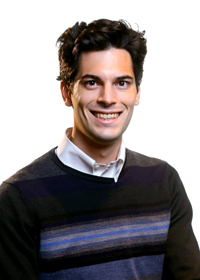
Paul Fanto
Yale University
Paul Fanto finds theoretical nuclear physics rewarding because it makes him focus on fundamental science while grappling with tangible applications. “The nucleus is real, and we don’t understand it,” he says. “There's this need to provide nuclear data right now for stewardship science, for nuclear energy technology, for medical isotope production. That makes for a very exciting back-and-forth.”
Fanto embraced physics relatively late, switching from political science in his junior year at Princeton University. His parents are lawyers and he enjoyed English and history in high school. But Fanto, a Department of Energy National Nuclear Security Administration Stewardship Science Graduate Fellowship (DOE NNSA SSGF) recipient, continued taking math and science. He was inspired by the way physicists defined specific, addressable problems, checked their answers and built on their results.
Fanto soon embarked on his first semester-long research experience, a theoretical project to simulate operation of the Large Hadron Collider’s proton accelerator beam. Researchers assumed that the protons acted independently of each other, but Fanto examined whether correlated behavior among the particles could introduce error and how that might change experimental results. “That idea that you could contribute to something in a meaningful way, even if it's small, was really encouraging for me,” he says. It was also his first experience developing and using his own computer code.
Even with this initial success, the idea of becoming a theoretical physicist still sounded daunting, Fanto says. He tried two experimental projects and “failed in a useful way” before taking stock of what he liked: quantum and statistical mechanics – theoretical methods that probe how subatomic particles behave. He also knew he wanted to focus on computation, rather than equations on a board, as his primary tool to understand these questions. Fanto spent his senior year working with Princeton physicist David Huse, who met with him weekly, helped him hone his research and ultimately inspired him to pursue graduate school in theoretical physics.
As a Yale Ph.D. student, Fanto pursued nuclear physics with Yoram Alhassid, who had developed high-performance computational methods to improve reliability in nuclear reaction codes. Such simulations are based on Hauser-Feshbach theory, a long-standing framework that lets researchers use nuclear reaction experimental data to extrapolate to nuclei that haven’t been tested.
Fanto has developed a new approach for calculating nuclear-state densities, which are properties that help researchers determine the number of stable configurations the nucleus can access as a reaction gives off energy. These values help researchers understand reactions because nuclear processes are more likely to occur if more energy levels are available for decay. Fanto has built on theory developed in the 1990s, applying it to heavier nuclei to make the computations more accurate. He’s extending this work to calculate strength functions, the probabilities that nuclei will decay by emitting a gamma-ray photon.
During his 2018 practicum at Los Alamos National Laboratory, Fanto worked with Toshihiko Kawano, who employs Hauser-Feshbach theory to produce nuclear data libraries used to model key stockpile stewardship-related reactions. Recent experiments produced results that didn’t match standard reaction models, and Fanto spent the summer exploring whether data analysis had distorted the experimental outcomes. He was able to rule out the potential analysis problem, but the underlying question remains unanswered.
Working at Los Alamos fueled Fanto’s budding interest in national security and defense research. After completing his Ph.D. in 2021, he will start a research position at the Institute for Defense Analyses (IDA), a think tank in Alexandria, Virginia. Fanto learned about the institute from a Los Alamos postdoctoral researcher and later met another IDA researcher, DOE NNSA SSGF alumnus Angelo Signoracci, at the fellowship’s 2019 program review. Those connections led him to his new job.
Beyond his graduate work, Fanto sings with the Yale Citations, an a cappella group for graduate and professional students. He has continued to feed his humanities interests, too, working as a Yale writing tutor and helping found an online science magazine, Yale Distilled.


